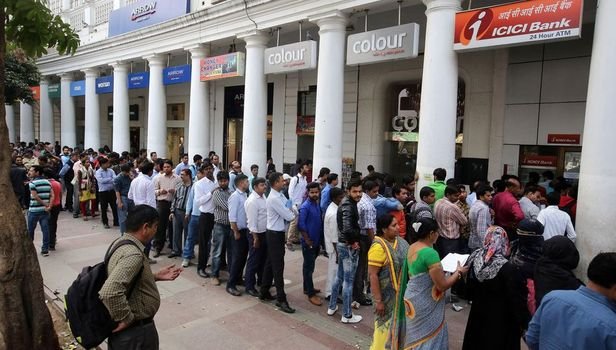Harvard Business Review: the decision of notesban is wrong to increase a payment platform
04 Nov 2017 ( Perwez Anwer, MD & CEO, IBTN GROUP )
In India, the debate in Pros and cons of the notes ban imposed by Prime Minister Narendra Modi last year - is continue. PM Modi announced the closure of old notes of 500 and 1000 rupees from 12 o'clock the same night on 8th November 2016 with immediate effect.
Upon completion of one year of the notes ban, Tafts University economist Bhaskar Chakraborty has reviewed this decision of the Modi government in the Harvard Business Review.
When the notes ban was imposed, about 86 percent of India's total cash was in the form of notes of 500 and 1000 rupees. Due to the notes ban, the whole country was frantic. Jobs of countless people went on, the notes ban was held responsible for the deaths of dozens of people.
According to Professor Bhaskar Chakraborty, notes ban was the decision without proper thinking and this has had a negative impact on the Indian economy, especially the poor.
According to Bhaskar Chakraborty, the rest of the world can learn four lessons from the decision of the notes ban. Read the following: What are those lessons in the opinion of Bhaskar Chakraborty?
First lesson: Choose experts carefully
According to Bhaskar Chakraborty, there are contingent results of any policy, so some basic exercises are necessary before applying them. Prior to implementing any policy, it is important to know the consolidated views of the particulars of the economy, business and technology sector. This becomes even more important in countries with complex economies like India.
Bhaskar has written that in India, the Modi government rejected the opinion of a capable man like Raghuram Rajan against the imposition of notes ban.
Bhaskar writes that so far it is not completely clear that the experts who took the opinion from the Modi government for the notes ban.
Bhaskar writes that before taking decisions with far-reaching effects like notes ban, there should be a transparent process of knowing the opinions of experts, statistics and their analysis and it should be officially recorded. Even if this is done secretly.
Bhaskar believes that the governments of democratic countries have the responsibility to respond to questions related to the preparation of their decisions.
Second lesson: Do not ignore basic data
According to Bhaskar, the purpose of all policies is for philanthropy, but every policy decision has some negative side. The decisions taken in the benefit of the masses prove to be heavy for any section of the society.
According to Bhaskar, it is important to assess fact-based profit-loss before any policy decision.
According to Bhaskar, before applying any policy, the basic data associated with them should be analyzed. If there is a high risk in implementing the policy, then before proceeding it should find answers to the questions raised on it. The main reason behind the notes ban was the intention to curb corruption and black money.
According to Bhaskar, many experts also praised this courageous decision of Narendra Modi, and the result of the recent regional elections proved its popularity, but some fundamental things related to it were not taken care of.
According to Bhaskar, first of all, the government should have been very careful about the decision to declare 86 percent cash in a jerk as unlawful because it was a feared tremor in the economy. Apart from this, 90 percent of India's working class works in the unorganized sector, which gets cash payment. It was difficult to ignore this double blow on the country's economy. Third, according to the recent analysis of income tax department, cash unclaimed income in the Indian economy is around 6 percent of the total economy. That is, the aim of the notes ban was wrong. Clearly, most of the country's undeclared income is present in the form of non-cash assets. All these figures are already present and those who applied for the notes ban should stop seeing them.
Lesson three: Keep in mind the human behavior
According to Bhaskar, before applying any policy, it should be taken into consideration for practical difficulties to be taken during landing on the ground. That is, the policy-makers should think about how people in the grassroots should behave.
According to Bhaskar, this important aspect of policy determination is how precise the way you treat the common practice beforehand.
According to Bhaskar, in the case of the notes ban on the Modi government missed it. The government could not figure out that people will not easily leave the money. They took out many thieves to escape on the notes ban. For instance, after notes ban some people who had thick black money gave their money to the brokers on a few percent commission, which divided the money to the common people by distributing that money and black money became white money.
Bhaskar has cited the latest figures of RBI, according to which about 99 percent of the deposits in 500 and 1000 rupees came back to the banks after the notes ban.
According to Bhaskar, it is clear from the figures that the basic reason for turning of black money into junk was proved to be wrong.
Fourth Lesson: Beware of Digital Tablet of silver
According to Bhaskar, the spread of mobile communication and digital technology often leads to confusion that these things can change overnight. One of the reasons for this is that the companies that occupy these things, offer their product and technology as a panacea for every disease.
Bhaskar believes that mobile and digital technology are very helpful in improving the system, but without basic preparations it is not advisable to fully depend on.
Bhaskar admits that the same happened in the case of the notes ban. When the Modi government failed to compensate for the shortage of cash after the notes ban, changing its agenda, it started giving the steps taken towards the digitization of the economy. The Modi government has started pushing India into something more rapidly in the digital age.
According to Bhaskar, according to the latest data of RBI, there was an increase in digital transactions at the time of the notes ban, because in the first few months people had no other option, but later it gradually decreased.
Bhaskar writes that the decision to close 86 percent of the cash to promote a payment platform is inconceivable.
(Click here for Android APP of IBTN. You can follow us on facebook and Twitter)
Share This News
About sharing
-
 16 Sep 2025
UN inquiry finds Israel’s war on Gaza to be genocide
16 Sep 2025
UN inquiry finds Israel’s war on Gaza to be genocide
UN inquiry finds Israel’s war on Gaza to be genocide
-
 16 May 2025
Has Donald Trump taken US-Gulf relations to a new era?
16 May 2025
Has Donald Trump taken US-Gulf relations to a new era?
Has Donald Trump taken US-Gulf relations to a new era?
May 16, 2...
-
 16 May 2025
What do the Gulf states gain from the US president's historic trip to the region?
16 May 2025
What do the Gulf states gain from the US president's historic trip to the region?
What do the Gulf states gain from the US president's historic trip to the regio...
-
 15 May 2025
Pakistan FM: US didn't force the ceasefire with India | Talk to Al Jazeera
15 May 2025
Pakistan FM: US didn't force the ceasefire with India | Talk to Al Jazeera
Pakistan FM: US didn't force the ceasefire with India | Talk to Al Jazeera
-
 15 May 2025
How will the lifting of US sanctions help Syrians rebuild their country?
15 May 2025
How will the lifting of US sanctions help Syrians rebuild their country?
How will the lifting of US sanctions help Syrians rebuild their country?



